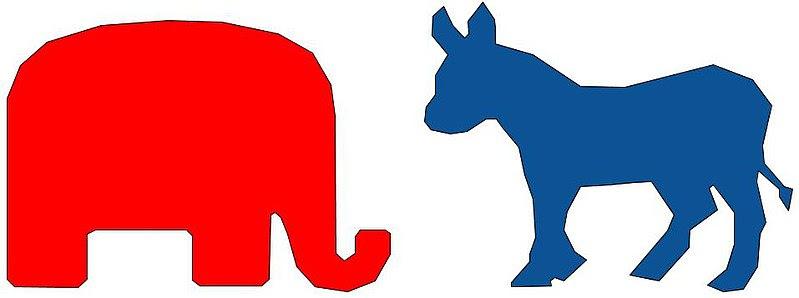Photo credit: Wikimedia Commons
Many Americans are asking the question “Why is nothing getting done in the Senate?” or “Why aren’t any bills passing that’ll genuinely help us?” While it may seem like one party is more at fault than the other, the bigger problem is how much influence the two parties have. The dominating two-party system is the biggest problem in the modern political scene.
Before I delve into why a two-party system is bad, it first needs to be defined. A two-party system is a governing system in which two parties of conflicting views control most, if not all, legislation. In the United States, there aren’t any seats held in Congress by someone who is not affiliated with the Republican or Democratic parties. The lack of political diversity represented in the government places the U.S. firmly under a two-party rule.
One of the major flaws of a two-party system is the fact that nothing gets done, or something gets done with a lot of opposition. This year alone, it is especially prevalent. For example, the George Floyd Justice In Policing Act which bans choke-holds, no-knock warrants in most cases, and makes it easier to prosecute police officers, passed with all Republicans voting no and only two Democrats voting no in the House Of Representatives (final vote of 220-212). Another example of blatant partisanism was the passing of H.R.1, known more commonly as the For The People Act, which passed with no Republicans voting yes, and only one Democrat voting no (final vote of 220-212). The fact that there was almost no crossing of party lines and no third parties to make a clear majority is more than slightly concerning for most Americans. A Gallup poll published in February 2021 showed that 62% of Americans believe that a third party is needed (up 22% from 2003 polling). Additionally, only 33% of Americans surveyed believe that the two parties are doing a good job representing their constituents.
Due to the two-party system, it’s near impossible for a third party to gain traction. For example, despite being the third-largest party in the U.S. with a large enough following to change some election outcomes, the Libertarians were not invited to the 2020 presidential debates. Additionally, a lot of major news outlets do not cover stories about third-party candidates outside of election season. On top of this, many people claimed that if you voted for a third party in the 2020 election, you were wasting your vote. Although this may seem insignificant, it prevented third-party candidates from gaining votes and expanding their influence. This is extremely detrimental to the nation as the left moves further left, the right moves further right, and moderate voters are forced to choose one side. Conditioning students and new voters to believe that voting for a third party is a wasted vote contributes directly to the oppressive two-party system. New voters need to decide what issues are most important to them, look into different political parties, and find the one which suits them best.
This system of government is not only bad for its citizens but foreign allies as well. Every time the presidency switches parties, we see a lot of change in how the country is run. For example, when President Trump was elected, he prioritized alliances with the Middle East, North Korea, and other non-traditional allies while pushing Europe to the side. However, when President Biden was elected, he tried to patch up relations with Europe and pushed the Middle East and North Korea to the side. Imagine you’re one of these countries. Your entire relationship with one of the most, if not the most, powerful country in the world depends on who wins the presidential election every four to eight years. This, as a result, turns the U.S. into a non-reliable ally/trade partner.
Over the next two weeks, I will explore six different third parties in the U.S. These articles will cover the basic beliefs of each party, at least one important member, and how popular they are in the U.S. Overall, I hope that both new and past voters will realize how parasitic the ruling two-party system is to the nation and that they don’t have to force themselves into the shells the Republicans and Democrats want them to.































